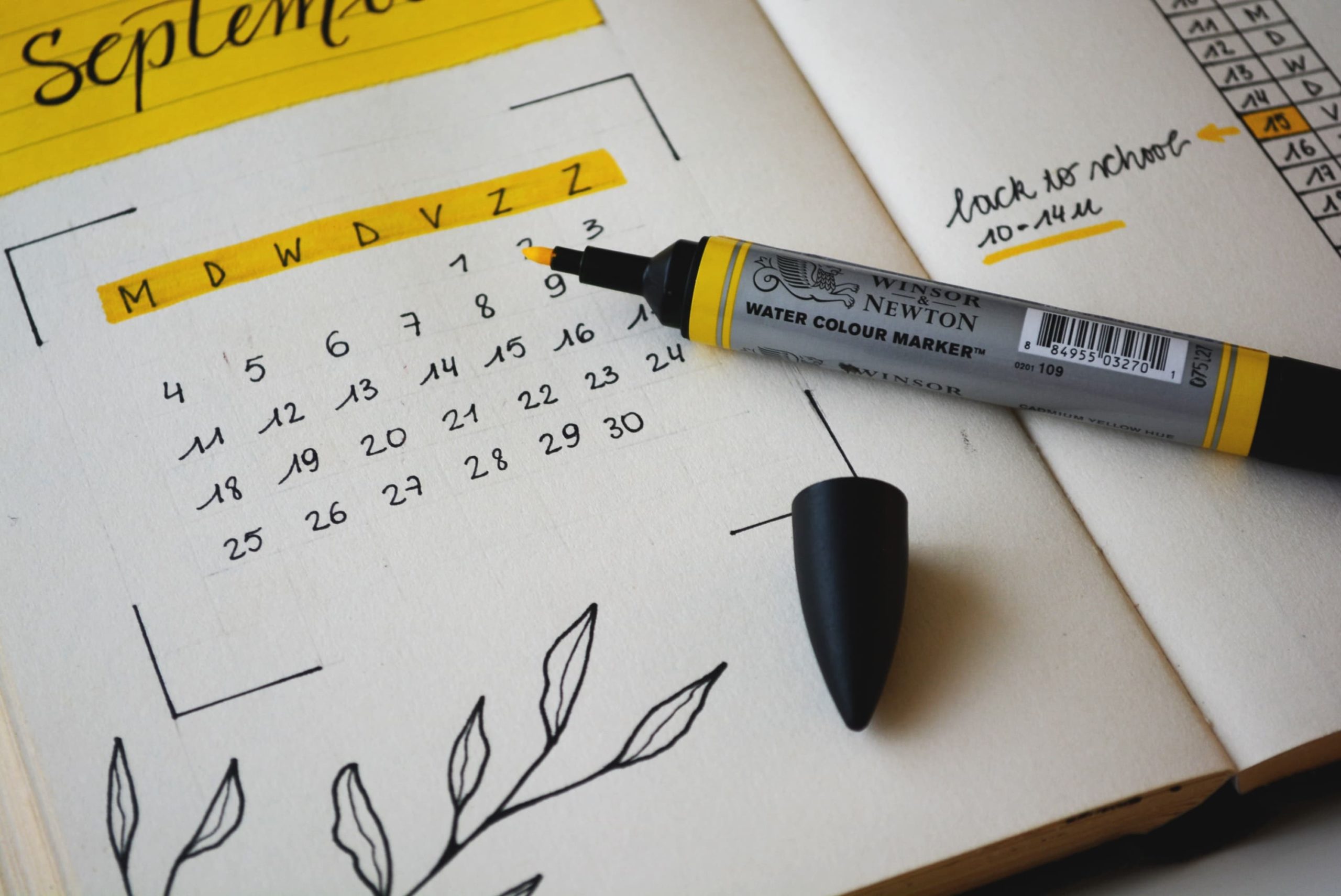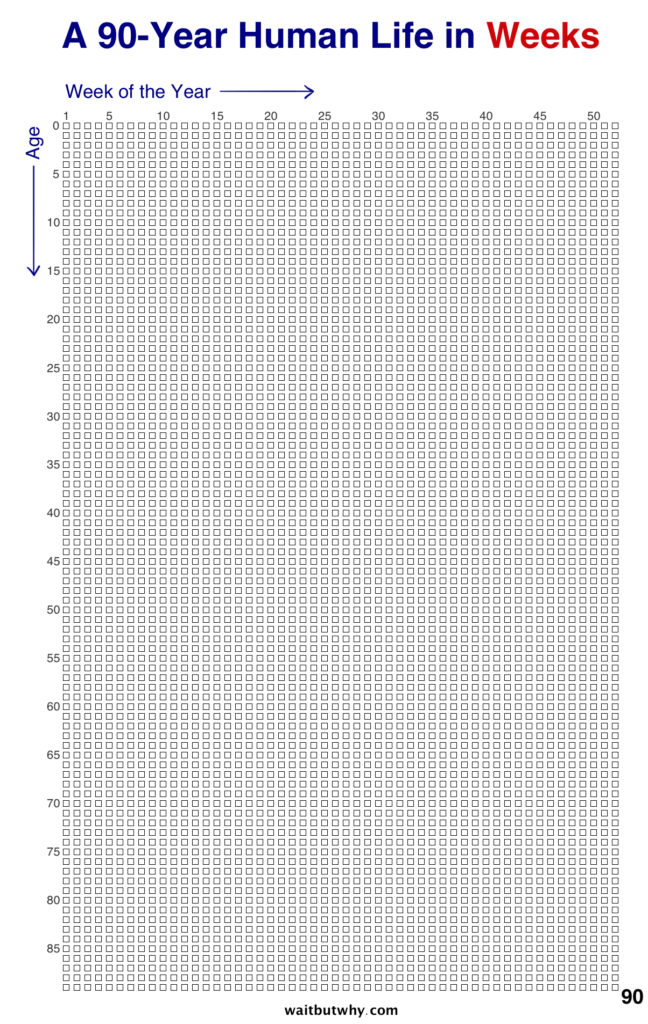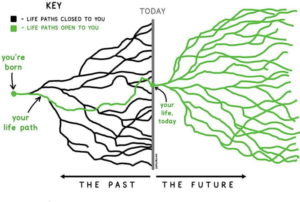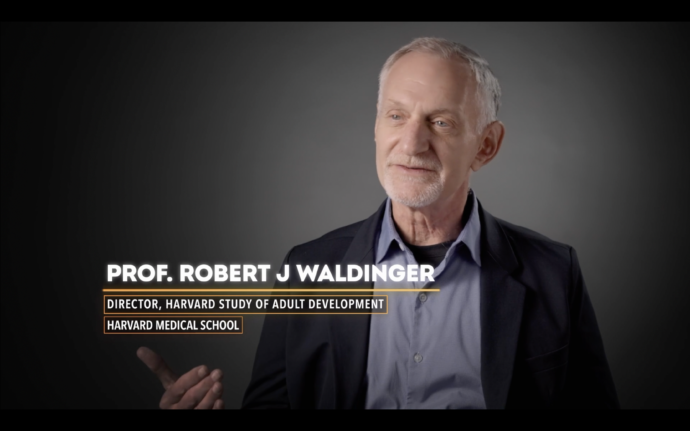
When in our lives have we ever been so aware of time? In the last two years, through the many phases of the pandemic, it seems time has become a rarified commodity. Time was, perhaps like never before in recent memory, taken away from us. Weddings were canceled, birthdays celebrated alone, and many lives were lived in no more than a few rooms for months at a time.
As is so often the case, it can be difficult to appreciate something until it is gone. Over the course of the pandemic, perhaps you, like many others, began to see how much you’ve taken time for granted.
Author Tim Urban has certainly felt this way. As a comic artist, Urban is a natural visual thinker. In considering his time, he drew up a calendar of sorts—a weekly chart of an entire life.
How many weeks are in a human life?
You might notice at first glance that it’s not all that big. This calendar shows every week, 52 boxes, of every year of a 90-year life. In that time, we only have 4,680 weeks. What’s more, by age 25, 1,300 of these weeks have already passed. While 90 years can be difficult to grasp, a week is quite knowable. And a week can slip by very quickly. It often feels like we have countless weeks ahead of us. But it’s just a few thousand — a number small enough to fit neatly in a single image.
Go one step further. These are just the weeks that you will be alive. Think of the things you actually love doing. Maybe it’s going to a baseball game, an art museum, or on a family vacation. In how many of your remaining weeks will you do those things? It may feel like there are many more chances left in life. But if you do one of these things once every three years, they will represent just a few small dots on your calendar of weeks. Maybe only 20 for the rest of your life.
How Many Opportunities Have You Missed?
Now think again. How many chances have you missed to do something you love?
Perhaps in the past two years, you have also adapted to our “new normal” and made peace with staying in, relinquishing plans and enjoyments. Through the pandemic, our physical health has been in serious need of protection, but as we emerge it is important to account for the mental toll of isolation, disruption, and loss. Intentionally getting back to the things and people that we love is now more important than ever.
Relationships are Fundamental to Our Lives
Anyone familiar with the Harvard Study of Adult Development and with the Lifespan Research Foundation won’t be surprised to hear that the time we have missed in relationships is perhaps the most vital time of all to both our happiness and health. Relationships are at the heart of our lives. Yet many of our most important connections have been placed on pause and will need to be picked up again. The sense of time passing has a new urgency. Tim Urban’s calculation is a vivid illustration of this point:
“The hardest math to process — and, in turn, the hardest pill to swallow — has to do with our relationships. I grew up spending some time with my parents almost every day. Since turning 19 and moving away for good, I’ve averaged about 10 to 15 days a year with them. If I’m one of the lucky ones, I’ll have quality time with my parents until I’m 60. That means that the day I headed off to college, I had something like 350 remaining parent days total — the amount of time I had with them every year of my childhood.”
Our most important relationships may wither if not well looked after. While the weeks of our lives may be numbered, the time we have for our close relationships can be greatly extended through attention and care. In Urban’s case, adding an extra week with his parents each year – perhaps a family vacation or just a week at home – almost doubles the time he will have left with them. Small changes like this can dramatically expand the calendar.
New Paths
Seeing this calendar and calculating your own remaining time can be a dangerous exercise. There’s good reason for Urban to refer to this exercise as “Depressing Math.” It can be paralyzing to see the entire span of life in one diagram and recognize how little time with certain people may be left. Yet the intention of this exercise is quite the opposite.
While there may be an initial shock, looking at the time you have left is an opportunity to commit to change. As we emerge from the pandemic, do Depressing Math and figure out how valuable the time you have left really is.
In that process, don’t dwell on the could-have-been. This is not an exercise intended to cause regret about time already passed. Instead, let it be an opening to new, richer paths. It may seem like it’s too late – like our current path is now linear and set out before us. Yet as this diagram reminds us, there are still so many possibilities that lie ahead. Urban shares his wisdom on the rare and vital opportunity to begin anew:
“These two delusions — that we have countless time ahead of us and that we can’t change our course — are a recipe for complacency. Shedding them can wake us up and inspire us to live more wisely. The past couple of years has left us with a joy deficit. When we picture a post-Covid world, we imagine having our old lives back. But we can actually go a step further and make up for the missed experiences, flipping the deficit into a surplus. If Covid has given us anything, it’s a rare chance for a reset. Let’s take it.”
As you begin to consider a reset, think about the things you could do now to explore new paths. Which friends could you reconnect with? What plans could you make together?
At the outset of a new journey, a guide can often be helpful. Thankfully Lifespan Research Foundation has the resources available to help. Learn more about our guided group course, which could be just the support you need to explore the many possible paths of your future.




